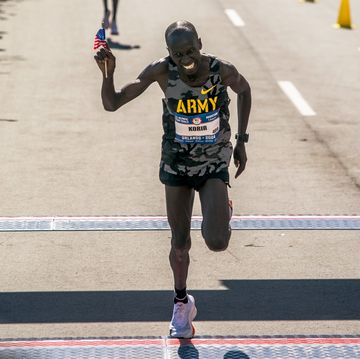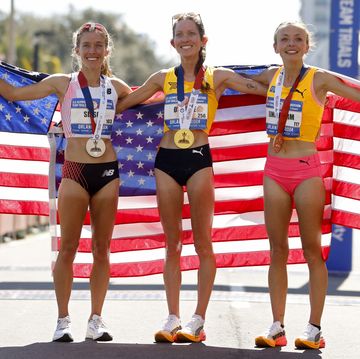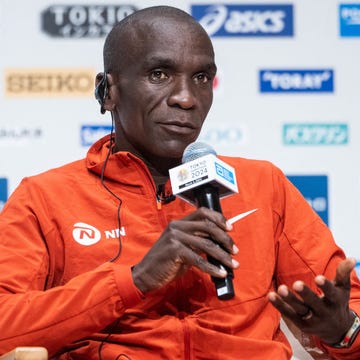With 150 meters remaining in the finals of the 1500 at the U.S. Olympic Track and Field Trials, Cole Hocker was way back. It appeared that Matthew Centrowitz, the reigning Olympic champion in the event, would win by a comfortable margin.
“I was pretty boxed in, and I thought to myself, ‘I feel way too good to get boxed in,’” Hocker told Runner’s World.
→ Join Runner’s World+ to stay up to date on the Tokyo Olympics!
Then, for just a moment, an opening formed. Hocker reacted instinctively and decisively, like a sprinter out of the blocks, and darted for the outside. The field was packed so tightly that Hocker’s move took him from sixth to second in just a few steps.
“As soon as I got out of the pack, I saw Centro and thought catching him was attainable,” Hocker said.
Hocker was still five meters behind Centrowitz, but it was now a race of two. He surged forward toward Centrowitz, but his form began to degrade. His head tilted back. His arms flailed. He pushed his chest out. But the gap continued to shrink.
Hocker passed Centrowitz just a few meters before the line, winning by less than a tenth of a second. Perhaps composure means nothing, and heart means everything; it was clear to everybody watching how badly Hocker wanted to win.
The University of Oregon standout will compete in the first round of the 1500 meters in Tokyo on Tuesday, August 3 at 9:05 a.m. in Tokyo (which is 8:05 p.m. EDT on Monday, August 2). Here’s what you need to know about Hocker.
After turning 20 just a month ago, Hocker will be the youngest runner in the Olympic 1500 meter field
Hocker became the youngest man to win the 1500 meters at the U.S. Trials in over a century. (In 1911, Abel Kiviat won just a few days after turning 19.) Hocker is the youngest U.S. Olympian in the event since 1968 when Marty Liquori got second at the U.S. Trials. Being the youngest man in the Tokyo field prompts excitement rather than concern for Hocker; so far, his youth has proven to be a tremendous strength.
Hocker isn’t intimidated by more established athletes, which we all saw at the Trials. As he crossed the finish line, Hocker raised a single finger to his lips, a “Shhhh to the haters,” according to Hocker.
Hocker’s mindset shifted when he ran a 3:50 mile in February
Hocker hasn't always seen himself as a champion, though. He says his perception of his ability changed in his first race this year, when he and his teammate Cooper Teare ran a 3:50 mile in February. Teare became the new collegiate record holder, and Hocker No. 2 all-time in the event.
“We had no idea how fast we were going,” Hocker said. “You can see it on our faces when we saw the clock.”
“It wasn't surprising to me, but it was impressive,” Ben Thomas, the associate head coach of distance at the University of Oregon, told Runner’s World. “I was like, ‘Well, this is ahead of schedule.’”
As is routine at Oregon, before the race, Thomas handed Hocker and Teare a sheet of paper with instructions. It detailed the splits to run—how fast they should go through various points of the race. The instructed pace would yield 3:49.
“Me and Cooper looked at each other like, ‘He can’t be serious,’” Hocker said.
“It’s the same thing as when Bannister was the first man to break 4 [minutes in the mile],” Hocker said. “People thought that the human heart would explode, but then other people broke 4 that year.”
Hocker continues, “We didn’t have 3:50 in our sights because nobody had ever done that before.”
Hocker had a packed racing schedule this year
Hocker’s 3:50 mile in February began a busy six-month period of racing that will culminate in Tokyo. Racing through the majority of the year—which is characteristic of collegiate running—can be strenuous on the body. Professional runners, alternatively, race fewer times and have the luxury of designing their race schedules to feature one major peak at the end of the year, like the Olympics.
This year, Hocker raced 23 times. Centrowitz, a pro for Nike’s Bowerman Track Club, only raced 11 times.
But Thomas organized the Ducks’ race schedule delicately. He understood, even anticipated, that the racing season could extend late into the summer. Thomas’s training program reflects the need to peak multiple times.
“The [Oregon men’s runners] were pretty hungry to race," Thomas said, especially since the runners took nearly a full calendar year off of racing during the pandemic. He was never worried about his athletes racing too many times. “We appreciated every opportunity to race because it was taken away for so long.”
Hocker credits the unique Oregon experience as the reason for his rapid improvement. “Having extremely good runners as teammates is the best thing you can do for your personal growth,” Hocker said. “You just don’t want to fall off that train.”
Hocker is not vaccinated, and a hubbub ensued when the public learned
July began quietly for Hocker. He found himself alone in Eugene. His training relaxed. He even had to skip a few days of running because of food poisoning. During the slow days, Hocker took up arts and crafts; he’s been constructing a mosaic for the past few weeks.
“It was super chill,” Hocker said. “I was enjoying it all.”
But then things became noisy. A widely-shared article revealed that Hocker hadn’t received his COVID-19 vaccine, and many people online publicized their outrage.
“I stayed offline for a few days,” said Hocker, who contracted COVID-19 earlier this year but did not experience any symptoms.
Olympic athletes are not required to be vaccinated in order to compete in Tokyo, but if athletes test positive, they will be pulled from the competition (which is what happened to U.S. pole vaulter Sam Kendricks).
Tokyo is currently under a state of emergency due to a spike in COVID-19 cases.
Centrowitz and Hocker, two Oregon stars from different generations, could race again in Tokyo
Like Hocker, Centrowitz was also a national champion when he competed for Oregon. Hocker said that people on the internet have manufactured a beef between him and Centro. In reality, it’s all love between the two ducks—merely friendly competition.
“I told him it was an honor to get to race against him. And he told me he had a ton of respect for me,” Hocker said.
For the first time, Hocker and Centro are teammates; they’ll both compete for Team USA in Tokyo. But of course, there’s only one spot on top of the podium.
“I want to beat him along with everybody else in that entire field,” Hocker said. “As soon as the gun goes off, it’s almost like I hate everybody.”
Hocker can go even faster in Tokyo
Hocker knows he can go faster than his current PR of 3:35.28, which he ran at the Trials. (He hasn’t yet run the Olympic standard of 3:35.00, but he qualified for the Games based on his world ranking.) He covered the final 800 meters of his NCAA victory in 1:49, and he closed the Trials in 1:50. That kind of aggressive negative split suggests that Hocker can lower his time if he needs to.
Hocker’s ultimate goal is to qualify for the Olympic final. “The final is what everyone sees,” he said. “People who don’t pay attention to our sport don’t know that there are two races leading up to the final.”
Over the previous five Olympic cycles, the U.S. has produced five 1,500 Olympic finalists. Historically, the U.S. has a much stronger record: Americans have earned 14 total medals in the event (the most of any country), and the U.S. is also the only country to ever sweep the podium, which happened in St. Louis in 1904.
Hocker hopes to continue the American tradition. “Once I’m in the final, I have just as good a shot as anybody to get a medal,” Hocker said
Hocker’s calm, quiet disposition suggests his mindset going into Tokyo: He’s prepared to let his performances speak for him. Of course, nerves are inevitable. When nerves set in at the Trials, Hocker, like anybody, experienced self-doubt. “If I don’t make this one, then I’ll only be 23 at the next Olympics,” he thought to himself. “I’m still young.”
But Hocker quelled his doubts. He’d remind himself, “You never know what could happen in the next three or four years.” Hocker said, “I better take advantage of this opportunity right now because it might not come again.”
Matt Wisner is a former runner for the University of Oregon, and a former teammate of Hocker’s.














